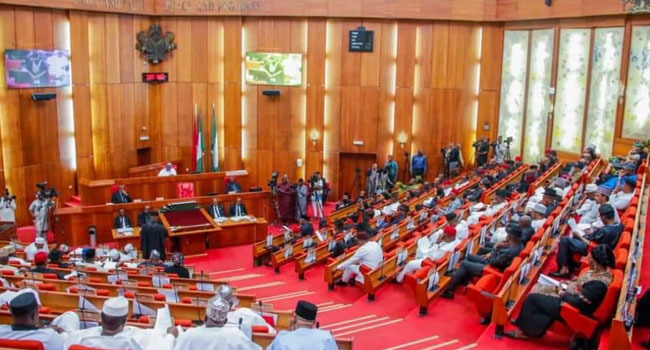Tolulope Eseyin
The Senate on Wednesday passed through second reading, a Bill for an Act to introduce measures aimed against the manufacturing, production, possession, and distribution of counterfeit goods in Nigeria.
Sponsored by Senator Ibikunle Amosun, the bill also provides for a criminal investigation into counterfeiting and seeks to make the prosecution of such crimeless cumbersome to provide effective control of counterfeit goods.
Presenting the lead debate on the bill, Senator Amosun explained that the proposed legislation was imperative as existing legislations have largely been limited, restrictive, and weak in enforcement mechanism.
He listed some of them to include the Trademark Act, National Agency for Food and Drug Administration and Control (NAFDAC) Act, and Standards Organisation of Nigeria Act.
Seconding the bill, Senator Tolu Odebiyi believes it will increase the nation’s internal production and create jobs for the people if the amount of counterfeit goods that come into Nigeria is minimised.
“This bill is a bill that is very apt and appropriate today,” he told his colleagues in the Senate Chamber of the National Assembly in Abuja. “I think this kind of bill that will criminalise the sale of counterfeit goods will only make our economy stronger.
“I think we also have to bear in mind that we strengthen our counterfeit laws so that Nigeria does not become a dumping ground for all counterfeit goods that are going to be brought into the country.”
The bill was read the second time and referred to the Committee on Trade and Investment which was asked to report back within four weeks
It seeks to further protect owners of trademarks and copyright against the release of similar (counterfeit) goods into the channels of commerce.
The lawmakers also attempted to consider a bill for an Act to establish the University of History, Archaeology, and Education and for other matters, 2021 by Senator Oyelola Ashiru.
But the consideration of the bill for the second reading was stood down until another legislative day.
Of the total proposed expenditure, N1.135 trillion would accrue from Internally Generated Revenues (IGRs) and federal transfers, while deficit financing of N253 billion would be sourced from external and domestic loans, and bonds projected to be within the state’s fiscal sustainability parameters.
The state would be earmarking an aggregate of N137.64 billion, representing 9.92 per cent of the 2022 budget, for the funding of green investment in environment, social protection, housing and community amenities.
On Security, the governor explained that the state’s continued investment in the sector had reaped positive dividends, stressing that more allocation would be channelled to security in 2022 to make Lagos safer for living, working and investment.
Despite the global economic downturn, he said Lagos had seen more construction machinery deployed to deliver new infrastructure in the areas of roads, rail, housing, health, education and waterways.
“There has been significant progress on the Lagos Rail Mass Transit projects, which include both the 27-kilometre Blue line that will run from Okokomaiko to Marina, and the 32-kilometre Red line that will run from Agbado to Oyigbo, and eventually to Marina,” Governor Sanwo-Olu told the lawmakers.
“These rails, when completed, will deliver a combined 32.5 million people every month on their respective routes, reducing travel time by over 250 per cent, increasing the productivity and quality of life of our people.
“The Red line will come with eight new modern train stations, 10 new overpasses and 13 pedestrian bridges. These ambitious projects are expected to be commissioned in the fourth quarter of 2022.”
The outgoing year’s budget, the governor said, performed “remarkably well” despite the challenges encountered by the state, noting that the expenditure performance at the third quarter of 2021 rose to 80 per cent.
He said the need to stabilise the state’s economy led to the adoption of far-reaching cost-saving measures, including restructuring of local borrowings to reduce overall debt service obligations on Lagos.
Governor Sanwo-Olu thanked the residents for supporting and standing by his administration in the past two years.
Noting that there were more challenges lying ahead, he urged them to join hands with him in delivering his programmes for common good, with an assurance that the pace of governance would be amplified in the coming years.

